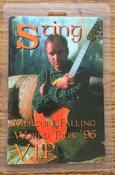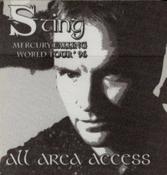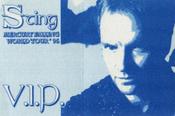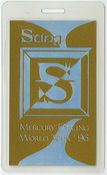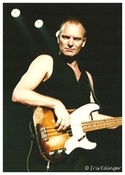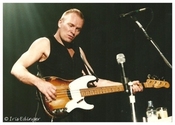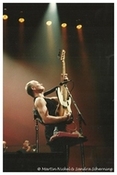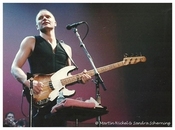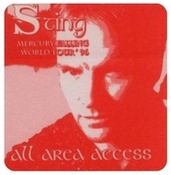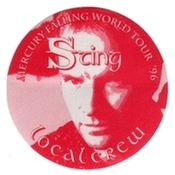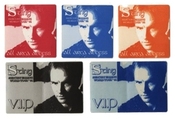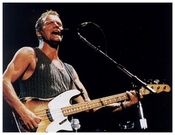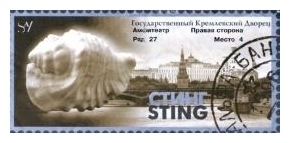
The red stars on the towers of the Moscow Kremlin...
The red stars on the towers of the Moscow Kremlin don't often meet the big western stars, so two of Sting's gigs in the Great Kremlin Palace (March 13 and 14) were a great sensation for Russia. The media went crazy and sometimes we fell nearly into Sting-mania. The tickets (from 15 to 100 US dollars) blew out in under 2 days and on the days of the concerts tickets were selling for around $400 on the black market. The special black ''ZIL'' limousine (a type of Russian government special car) with the license number STING 77 took Mr. Sumner around Moscow. The shows were not commercial in the truest sense because the local Alfa bank paid for everything to promote the concert, and the ticket money went to a local charity.
It was standing room only in this former Palace for the Communist Congress - and the ''New Russians'', in fur, gold and diamonds occupied most of the first fifty rows. It was obvious they didn't bother themselves what kind of artist they want to see - he's The Big Star. But the rest of the audience was warm and excited to listen to Sting.
The March 13th concert was the first in his current world tour. Russians call it ''wet'' - the program was not perfectly cooked yet, and the band was a little afraid of the new audience, new programme and bad acoustics of this monstrous official Palace.
Sting's band is the same that recorded the 'Mercury Falling' album, which is now firmly on the top of the Russian charts - with no spare copies in the shops - and in the Top 5 in U.K., with the exception of the Memphis horns. If you already have listened to 'Mercury Falling' and have the old live double (non United States) album 'Bring On The Night', you can mix the impression to generate a picture of his sound. Sting shows himself as a grown-up, tired, obsessed with what-is-the-meaning-of-it-all problems, but still powerful musician.
The improvisation and personal instrument-playing possibilities of, say Mr. Kenny Kirkland, are bound very tightly to the pop-format of the concert. Everything was well rehearsed and prepared long before the concert including every little gesture and musical ''improvisation''. Sting moved rarely and slowly; it's the father of six children on the stage, not the rock-rebel or jazz-pop-classic genius in free flight of the fantasy. In this critic's estimation, the show was performed not to expand on any of Sting's horizons, but to bring music from his most recent album directly to the people.
The second show was much more relaxed because of even better sound. The set list was copied from the night before with Russian ''How are you?'''s for the audience, one-time Sting jumping, one-time moving from left corner to the right corner (the most visible gesture during the whole show) and an improvisation of 'When The World Is Running Down'. The problem is, despite any lack of Sting doing anything surprising during his show, the audience - as well as myself - visibly and audibly liked the show. When the music is this good, even a less than perfect stage presence can't dampen the overall concert.
The concert was filmed by the main Russian TV and they were allowed to shoot first three song to 15 television companies from all around the world.
(c) Consumable by Oleg Pshenichny
Sting has always been a confused musical concept...
Sting's inaugural concert in Russia started off on the wrong foot as early as the first appearance of the ticket scalpers, whose russified pronunciation of the star's name unintentionally previewed the show: ''Buying tickets for Stin-k! Selling tickets for Stin-k!''
Sting has always been a confused musical concept. When he got too popular as a rock star with the Police, he went solo to become a pop star. But he was never really happy with that role either.
In the end he became a sort of amorphous record-selling phenomenon, a pop vocalist who tries half-heartedly to be a sex-symbol and writes songs he hopes people need footnotes to understand, since he knows exactly who his audience is.
Unfortunately, Sting arrived in Moscow at a time when Russians themselves, facing a return to communism and the subsequent end of Western liberal excesses like rock concerts, are very confused about who they are. As a result, Sting's esoteric concert Wednesday night at the Kremlin Palace came across as a mutual identity crisis in action - a quiet show by a wooden performer in front of a bewildered audience. The show started off well. As he usually does, Sting began his first set with a pair of a top 40 standards, the saccharine solo hit 'Love Is The Seventh Wave' and the Police favourite 'King Of Pain', before force-feeding his audience a dozen or so of his nameless vegetarian singles.
But after the initial outburst of excitement, the crowd quickly calmed down, and after the first hour or so there were people sleeping in the balconies.
''I didn't know what I expected,'' said Olga Yakovleva, 28, who along with her boyfriend left about an hour into the show. ''I came to wanting to dance, but I guess during the show I remembered that you don't really dance to Sting.''
''The deputies left early,'' said Oksana, one of the coat room attendants, recalling the Palace's days as the home of the Communist Supreme Soviet as she handed out coats to the slow trickle of exiting spectators midway through the show.
Significantly, Sting himself chose not to call attention to his venue, despite the fact that it was mentioned in his 1986 breakthrough ''political'' hit, 'Russians' (permission to respond to all the requests... in the rhetorical speeches of the Soviet'').
Much like - pardon the simile - a journalist who hopes he never meets the subjects of his inaccurate articles, Sting avoided singing his heavy-handed Cold War anthem, probably realizing that not even a language barrier would be enough to prevent his audience from recognising that he's stolen the song's melody from Prokofiev's 'Lieutenant Kitje Suite'.
Despite it all, Sting's concert did create a fuss commensurate with his superstar status. Scalpers before the concert were getting up to 2.5 million rubles ($500) for tickets, and the hall was packed with men in Hugo Boss suits and women in furs.
And by the end of the show, there were at least some people getting up out of their seats and dancing. There was even genuine relief and enthusiasm when, for his first encore, Sting dragged out his mega-hit 'Every Breath You Take', a song whose popularity he lampooned in his first solo album by humming 'every cake you bake' and which he performed mechanically in Moscow, before finishing off his bottle of spring water and racing off stage to pick up his check.
Nonetheless, the audience loved the song and called him out for another encore.
''It was different from what I thought it would be,'' said Yakovleva. ''I went to a Chili Peppers concert in America once, and that was different. But still, I had an okay time.''
(c) The Moscow Times by Matt Taibbi
The red stars on the towers of the Moscow Kremlin don't often meet the big western stars, so two of Sting's gigs in the Great Kremlin Palace (March 13 and 14) were a great sensation for Russia. The media went crazy and sometimes we fell nearly into Sting-mania. The tickets (from 15 to 100 US dollars) blew out in under 2 days and on the days of the concerts tickets were selling for around $400 on the black market. The special black ''ZIL'' limousine (a type of Russian government special car) with the license number STING 77 took Mr. Sumner around Moscow. The shows were not commercial in the truest sense because the local Alfa bank paid for everything to promote the concert, and the ticket money went to a local charity.
It was standing room only in this former Palace for the Communist Congress - and the ''New Russians'', in fur, gold and diamonds occupied most of the first fifty rows. It was obvious they didn't bother themselves what kind of artist they want to see - he's The Big Star. But the rest of the audience was warm and excited to listen to Sting.
The March 13th concert was the first in his current world tour. Russians call it ''wet'' - the program was not perfectly cooked yet, and the band was a little afraid of the new audience, new programme and bad acoustics of this monstrous official Palace.
Sting's band is the same that recorded the 'Mercury Falling' album, which is now firmly on the top of the Russian charts - with no spare copies in the shops - and in the Top 5 in U.K., with the exception of the Memphis horns. If you already have listened to 'Mercury Falling' and have the old live double (non United States) album 'Bring On The Night', you can mix the impression to generate a picture of his sound. Sting shows himself as a grown-up, tired, obsessed with what-is-the-meaning-of-it-all problems, but still powerful musician.
The improvisation and personal instrument-playing possibilities of, say Mr. Kenny Kirkland, are bound very tightly to the pop-format of the concert. Everything was well rehearsed and prepared long before the concert including every little gesture and musical ''improvisation''. Sting moved rarely and slowly; it's the father of six children on the stage, not the rock-rebel or jazz-pop-classic genius in free flight of the fantasy. In this critic's estimation, the show was performed not to expand on any of Sting's horizons, but to bring music from his most recent album directly to the people.
The second show was much more relaxed because of even better sound. The set list was copied from the night before with Russian ''How are you?'''s for the audience, one-time Sting jumping, one-time moving from left corner to the right corner (the most visible gesture during the whole show) and an improvisation of 'When The World Is Running Down'. The problem is, despite any lack of Sting doing anything surprising during his show, the audience - as well as myself - visibly and audibly liked the show. When the music is this good, even a less than perfect stage presence can't dampen the overall concert.
The concert was filmed by the main Russian TV and they were allowed to shoot first three song to 15 television companies from all around the world.
(c) Consumable by Oleg Pshenichny
Sting has always been a confused musical concept...
Sting's inaugural concert in Russia started off on the wrong foot as early as the first appearance of the ticket scalpers, whose russified pronunciation of the star's name unintentionally previewed the show: ''Buying tickets for Stin-k! Selling tickets for Stin-k!''
Sting has always been a confused musical concept. When he got too popular as a rock star with the Police, he went solo to become a pop star. But he was never really happy with that role either.
In the end he became a sort of amorphous record-selling phenomenon, a pop vocalist who tries half-heartedly to be a sex-symbol and writes songs he hopes people need footnotes to understand, since he knows exactly who his audience is.
Unfortunately, Sting arrived in Moscow at a time when Russians themselves, facing a return to communism and the subsequent end of Western liberal excesses like rock concerts, are very confused about who they are. As a result, Sting's esoteric concert Wednesday night at the Kremlin Palace came across as a mutual identity crisis in action - a quiet show by a wooden performer in front of a bewildered audience. The show started off well. As he usually does, Sting began his first set with a pair of a top 40 standards, the saccharine solo hit 'Love Is The Seventh Wave' and the Police favourite 'King Of Pain', before force-feeding his audience a dozen or so of his nameless vegetarian singles.
But after the initial outburst of excitement, the crowd quickly calmed down, and after the first hour or so there were people sleeping in the balconies.
''I didn't know what I expected,'' said Olga Yakovleva, 28, who along with her boyfriend left about an hour into the show. ''I came to wanting to dance, but I guess during the show I remembered that you don't really dance to Sting.''
''The deputies left early,'' said Oksana, one of the coat room attendants, recalling the Palace's days as the home of the Communist Supreme Soviet as she handed out coats to the slow trickle of exiting spectators midway through the show.
Significantly, Sting himself chose not to call attention to his venue, despite the fact that it was mentioned in his 1986 breakthrough ''political'' hit, 'Russians' (permission to respond to all the requests... in the rhetorical speeches of the Soviet'').
Much like - pardon the simile - a journalist who hopes he never meets the subjects of his inaccurate articles, Sting avoided singing his heavy-handed Cold War anthem, probably realizing that not even a language barrier would be enough to prevent his audience from recognising that he's stolen the song's melody from Prokofiev's 'Lieutenant Kitje Suite'.
Despite it all, Sting's concert did create a fuss commensurate with his superstar status. Scalpers before the concert were getting up to 2.5 million rubles ($500) for tickets, and the hall was packed with men in Hugo Boss suits and women in furs.
And by the end of the show, there were at least some people getting up out of their seats and dancing. There was even genuine relief and enthusiasm when, for his first encore, Sting dragged out his mega-hit 'Every Breath You Take', a song whose popularity he lampooned in his first solo album by humming 'every cake you bake' and which he performed mechanically in Moscow, before finishing off his bottle of spring water and racing off stage to pick up his check.
Nonetheless, the audience loved the song and called him out for another encore.
''It was different from what I thought it would be,'' said Yakovleva. ''I went to a Chili Peppers concert in America once, and that was different. But still, I had an okay time.''
(c) The Moscow Times by Matt Taibbi

